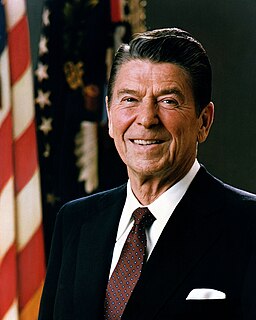 W
WRonald Wilson Reagan was an American politician who served as the 40th president of the United States from 1981 to 1989. A member of the Republican Party, he previously served as the 33rd governor of California from 1967 to 1975 after a career as a Hollywood actor and union leader.
 W
WThe 1966 California gubernatorial election was held on November 8, 1966. The election was a contest between incumbent Governor Pat Brown, the Democratic candidate, and actor Ronald Reagan, the Republican candidate. Reagan mobilized conservative voters and defeated Brown in a landslide. This was the second consecutive gubernatorial election in which Brown ran against a future Republican president.
 W
WThe 1970 California gubernatorial election was held on November 3, 1970. The incumbent Governor, Republican Ronald Reagan, won re-election over Democrat and Speaker of the Assembly Jesse "Big Daddy" Unruh.
 W
WThe 1980 United States presidential election was the 49th quadrennial presidential election. It was held on Tuesday, November 4, 1980. Republican nominee Ronald Reagan defeated incumbent Democratic president Jimmy Carter in a landslide victory. This was the second successive election in which the incumbent president was defeated, after Carter himself defeated Gerald Ford four years earlier in 1976. Additionally, it was only the second time, and the first in nearly 100 years that a Republican candidate defeated an incumbent Democrat. Due to the rise of conservatism following Reagan's victory, some historians consider the election to be a political realignment that began with Barry Goldwater's presidential campaign in 1964, and the 1980 election marked the start of the Reagan Era.
 W
WThe 1984 United States presidential election was the 50th quadrennial presidential election. It was held on Tuesday, November 6, 1984. Incumbent Republican President Ronald Reagan defeated former Vice President Walter Mondale, the Democratic candidate, in a landslide victory, winning 525 electoral votes and 58.8 percent of the popular vote. No other candidate in United States history has ever matched Reagan's electoral vote total in a single election.
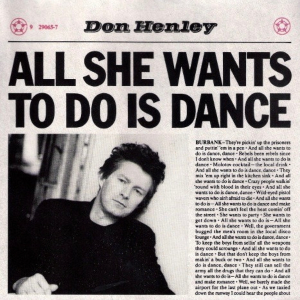 W
W"All She Wants to Do Is Dance" is a song written by Danny Kortchmar and performed by Don Henley, co-lead vocalist and drummer for Eagles. It was released as the second single from Henley's second studio solo album, Building the Perfect Beast, being Henley's sixth single. It was one of Henley's most commercially successful singles.
 W
WBel Air Church is a member of the Presbyterian Church (USA), and has a campus located on the famed Mulholland Drive in the Bel Air neighborhood of Los Angeles, California. An iconic Los Angeles church, it has been listed on the top 10 most visited churches in Los Angeles.
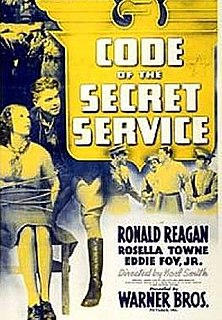 W
WCode of the Secret Service is a 1939 film directed by Noel M. Smith and starring Ronald Reagan. It is the second of four films in the U.S. Secret Service Agent Brass Bancroft series, having been preceded by Secret Service of the Air (1939) and followed by Smashing the Money Ring (1939) and Murder in the Air (1940).
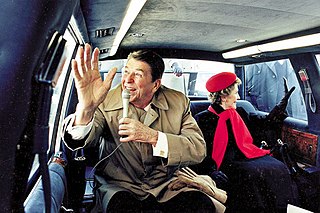 W
WThis is the electoral history of Ronald Reagan. Reagan, a Republican, served as the 40th president of the United States (1981–89) and earlier as the 33rd governor of California (1967–75). At 69 years, 349 days of age at the time of his first inauguration, Reagan was the oldest person to assume the presidency in the nation's history, until Donald Trump was inaugurated in 2017 at the age of 70 years, 220 days. In 1984, Reagan won re-election at the age of 73 years, 274 days, and was the oldest person to win a US presidential election until Joe Biden won the 2020 United States presidential election at the age of 77 years, 349 days.
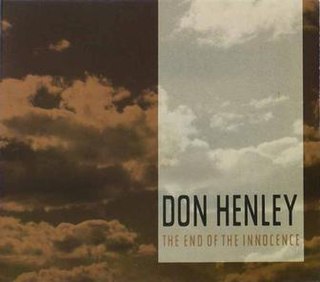 W
W"The End of the Innocence" is the lead single and title track from Don Henley's third solo studio album of the same name, released in 1989. Henley co-wrote and co-produced the song with Bruce Hornsby, who also performed piano; both artists perform the song live in their respective concerts. The single peaked at number eight on the US Billboard Hot 100, becoming his fifth solo top-ten hit on the chart. "The End of the Innocence" also became his fourth number-one single on the Album Rock Tracks chart. In Canada, it reached number three on the RPM Top Singles and Adult Contemporary charts. The song received Grammy nominations for Record of the Year and Song of the Year.
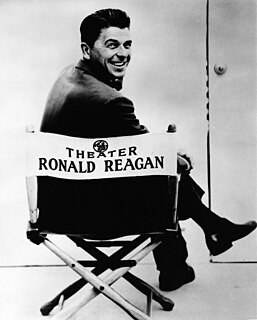 W
WGeneral Electric Theater was an American anthology series hosted by Ronald Reagan that was broadcast on CBS radio and television. The series was sponsored by General Electric's Department of Public Relations.
 W
W"Senator, you're no Jack Kennedy" was a remark made during the 1988 United States vice-presidential debate by Democratic vice-presidential candidate Senator Lloyd Bentsen to Republican vice-presidential candidate Senator Dan Quayle in response to Quayle's mentioning the name of John F. Kennedy, the 35th President of the United States. Since then, the words "You're no Jack Kennedy," or some variation on the remark, have become a part of the political lexicon as a way to deflate politicians or other individuals perceived as thinking too highly of themselves. Michael Dukakis and Bentsen later went on to lose the 1988 United States presidential election to George H. W. Bush and Quayle, who thus became Vice President of the United States.
 W
WRonald Reagan was the Governor of California for two terms, the first beginning in 1967 and the second in 1971. He left office in 1975, declining to run for a third term. Robert Finch, Edwin Reinecke and John L. Harmer served as lieutenant governors over the course of his governorship.
 W
WHellcats of the Navy is a 1957 American black-and-white World War II submarine film drama from Columbia Pictures, produced by Charles H. Schneer and directed by Nathan Juran. The film stars Ronald Reagan and his wife, billed under her screen name Nancy Davis, and Arthur Franz. This was the only feature film in which the Reagans acted together, either before or after their 1952 marriage.
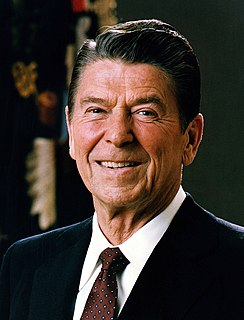 W
WFrom January 21 to June 3, 1980, voters of the Republican Party chose its nominee for president in the 1980 United States presidential election. Retired Hollywood actor and two-term California governor Ronald Reagan was selected as the nominee through a series of primary elections and caucuses culminating in the Republican National Convention held from July 14 to July 17, 1980, in Detroit, Michigan.
 W
WInternational Squadron is a 1941 American war film directed by Lewis Seiler and Lothar Mendes that starred Ronald Reagan, Olympe Bradna and in his final film, James Stephenson. The film is based on the Eagle Squadrons, American pilots who volunteered to fly for the Royal Air Force during World War II. International Squadron featured noted Hollywood pilot Paul Mantz who acted as the film's aerial coordinator and flew during the production.
 W
WSuzanne Massie is an American scholar of Russian history who played an important role in the relations between Ronald Reagan and the Soviet Union in the final years of the Cold War.
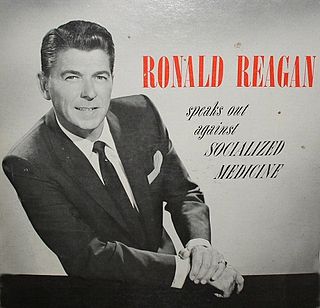 W
WOperation Coffee Cup was a campaign conducted by the American Medical Association (AMA) during the late 1950s and early 1960s in opposition to the Democrats' plans to extend Social Security to include health insurance for the elderly, later known as Medicare. As part of the plan, doctors' wives would organize coffee meetings in an attempt to convince acquaintances to write letters to Congress opposing the program. The operation received support from Ronald Reagan, who in 1961 produced the LP record Ronald Reagan Speaks Out Against Socialized Medicine for the AMA, outlining arguments against what he called socialized medicine. This record would be played at the coffee meetings.
 W
WRonald Wilson Reagan was an American politician who served as the 40th president of the United States from 1981 to 1989. A member of the Republican Party, he previously served as the 33rd governor of California from 1967 to 1975 after a career as a Hollywood actor and union leader.
 W
WRonald Reagan's tenure as the 40th president of the United States lasted from his first inauguration on January 20, 1981, until January 20, 1989. Reagan, a Republican from California, took office following a landslide victory over Democratic incumbent President Jimmy Carter in the 1980 presidential election. Four years later, in the 1984 election, he defeated Democrat Walter Mondale to win re-election in a larger landslide. Reagan was succeeded by his vice president, George H. W. Bush, who won the 1988 presidential election with Reagan's support. Reagan's 1980 election resulted from a dramatic conservative shift to the right in American politics, including a loss of confidence in liberal, New Deal, and Great Society programs and priorities that had dominated the national agenda since the 1930s.
 W
WRancho del Cielo, also known in its English translation as Sky's Ranch or Heaven's Ranch, is a 688-acre (1.075 sq mi)/278-hectare (2.78 km2) ranch located atop the Santa Ynez Mountain range northwest of Santa Barbara, California, United States. It served as a vacation home for President Ronald Reagan and First Lady Nancy Reagan.
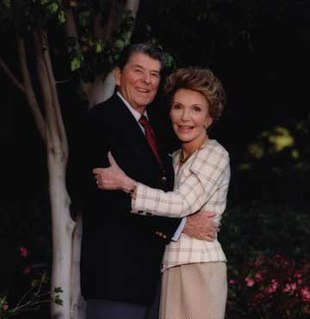 W
WRonald Reagan Day is a day of recognition that occurs every February 6, starting in 2011, in the state of California for Ronald Reagan, who was that state's governor from 1967 to 1975 and President of the United States from 1981 to 1989.
 W
WA Reagan Democrat is a traditionally Democratic voter in the United States, referring initially to white working class Rust Belt and California residents, and later solely to white working-class Rust Belt, who left their party to support Republican presidents Ronald Reagan during either or both of the 1980 and 1984 presidential elections, George H. W. Bush during the 1988 presidential election, and George W. Bush during either or both of the 2000 and 2004 elections.
 W
WThe Reagan Era or Age of Reagan is a periodization of recent American history used by historians and political observers to emphasize that the conservative "Reagan Revolution" led by President Ronald Reagan in domestic and foreign policy had a lasting impact. It overlaps with what political scientists call the Sixth Party System. Definitions of the Reagan Era universally include the 1980s, while more extensive definitions may also include the late 1970s, the 1990s, the 2000s, the 2010s, and even the 2020s. In his 2008 book, The Age of Reagan: A History, 1974–2008, historian and journalist Sean Wilentz argues that Reagan dominated this stretch of American history in the same way that Franklin D. Roosevelt and his New Deal legacy dominated the four decades that preceded it.
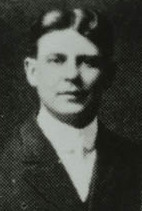 W
WJohn Edward "Jack" Reagan was the father of radio station manager Neil Reagan (1908–1996) and Ronald Reagan (1911–2004), a motion picture actor, who served as the 33rd governor of California and 40th president of the United States.
 W
WThe Birthplace of Ronald Reagan, also known as the Graham Building, is located in an apartment on the second floor of a late 19th-century commercial building in Tampico, Illinois, United States. The building was built in 1896 and housed a tavern from that time until 1915. On February 6, 1911 the future 40th President of the United States, Ronald Reagan, was born in the apartment there, the family moving into a house in Tampico a few months later.
 W
WOn June 5, 2004, Ronald Reagan, the 40th president of the United States, died after having suffered from Alzheimer's disease for nearly a decade. Reagan was the first former U.S. president to die since Richard Nixon in 1994. At the age of 93 years and 120 days, Reagan was the longest-lived U.S. president in history until November 12, 2006, when his record was then surpassed by Gerald Ford. His seven-day state funeral followed. After Reagan's death, his body was taken from his Bel Air, Los Angeles home to the Kingsley and Gates Funeral Home in Santa Monica, California to prepare the body for burial. On June 7, Reagan's casket was transported by hearse and displayed at the Ronald Reagan Presidential Library in Simi Valley, California, then flown to Washington, D.C. on June 9 for a service, public viewing and tributes at the U.S. Capitol.
 W
WThe filmography of Ronald Reagan, the 40th President of the United States, includes many motion pictures and television episodes. Reagan's acting career began in 1937 when he contracted with Warner Bros. from his absence during World War II, Reagan would make most of his movies with Warner Bros. With the studio, he starred in such films as Dark Victory, Knute Rockne, All American, and Kings Row – which was nominated for the Academy Award for Best Picture in 1943.
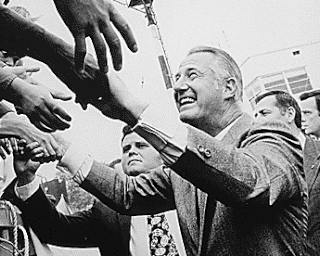 W
WThis article lists those who were potential candidates for the Republican nomination for Vice President of the United States in the 1968 election. After winning the Republican presidential nomination at the 1968 Republican National Convention, former Vice President Richard Nixon convened a series of meetings with close advisers and party leaders such as Strom Thurmond in order to choose his running mate. Nixon ultimately asked the convention to nominate Maryland Governor Spiro Agnew as his running mate. By a large margin, Agnew won the vice presidential nomination on the first ballot over Michigan Governor George W. Romney, who was supported by a faction of liberal Republicans. Nixon chose Agnew because he wanted a centrist who was broadly acceptable to the party, had experience with domestic issues, and appealed to Southern voters. The Nixon-Agnew ticket defeated the Humphrey-Muskie ticket, and also won re-election in 1972, defeating the McGovern-Shriver ticket. However, Agnew was forced to resign as Vice President in 1973 due to a controversy regarding his personal taxes.
 W
WThis article lists those who were potential candidates for the Republican nomination for Vice President of the United States in the 1976 election. At the 1976 Republican National Convention, incumbent President Gerald Ford narrowly won the presidential nomination over former California Governor Ronald Reagan. Ford had decided not to choose Vice President Nelson Rockefeller as his running mate, due to Rockefeller's unpopularity with the right wing of the Republican Party. He instead chose Senator Bob Dole of Kansas. Dole was acceptable to the conservative wing of the party, and Ford hoped that Dole would help the ticket win the western states and the agricultural vote. The Ford-Dole ticket lost the general election to the Carter-Mondale ticket. Though he would not win the presidential nomination, Reagan announced before the convention that he would pick Senator Richard Schweiker of Pennsylvania as his running mate. Dole went on to become Senate Republican leader, and the Republican presidential nominee in 1996, losing the general election to incumbent President Bill Clinton.
 W
WThis article lists those who were potential candidates for the Republican nomination for Vice President of the United States in the 1980 election. Former California Governor Ronald Reagan won the 1980 Republican nomination for President of the United States, and chose former Texas Representative George H. W. Bush as his running mate.
 W
WRex was a Cavalier King Charles Spaniel owned by Ronald Reagan and his wife Nancy during his term as President of the United States.
 W
WUSS Ronald Reagan (CVN-76) is a Nimitz-class, nuclear-powered supercarrier in the service of the United States Navy. As the ninth ship of her class, she is named in honor of Ronald W. Reagan, President of the United States from 1981 to 1989. She was built at Newport News Shipbuilding in Newport News, Virginia, and was commissioned on 12 July 2003.
 W
WThe Ronald Reagan Freedom Award is the highest civilian honor bestowed by the private Ronald Reagan Presidential Foundation. The award is given to "those who have made monumental and lasting contributions to the cause of freedom worldwide."
 W
WThe 1980 presidential campaign of Ronald Reagan, was formally launched on November 13, 1979. Ronald Reagan and George H. W. Bush were elected president and vice president of the United States. They defeated the incumbent Democratic President Jimmy Carter and Vice President Walter Mondale. Reagan, a Republican and former governor of California, announced his third presidential bid in a nationally televised speech from New York City. He campaigned extensively for the primaries after losing the Iowa caucus to Bush. In the primaries, he won 44 states and 59.8% of the vote. He decided initially to nominate former president Gerald Ford as his running mate, but Ford wanted such extended powers as vice president that their ticket would effectively amount to a "co-presidency". As a result, negotiations to form a Reagan–Ford ticket ceased. Reagan then selected former Congressman and Director of the Central Intelligence Agency George H. W. Bush as his vice-presidential running mate.
 W
WThe 1984 presidential campaign of Ronald Reagan, the 40th President of the United States, announced his candidacy for re-election as president in Washington, D.C. on October 17, 1983. On August 23, 1984, he again became the nominee of the Republican Party for the 1984 presidential election. After receiving the Republican nomination, he confirmed that Vice President George H. W. Bush would remain as his running mate.
 W
WCraigan Paul Shirley is an American consultant and author of the 2011 New York Times bestseller "December 1941" as well as four books on Ronald Reagan.
 W
WTampico is a village located in Tampico Township, Whiteside County, Illinois, United States next to Rock Falls and Sterling, IL. As of the 2010 census the village had a total population of 790, up from 772 at the 2000 census. It is known as the birthplace of Ronald Reagan, the 40th President of the United States.
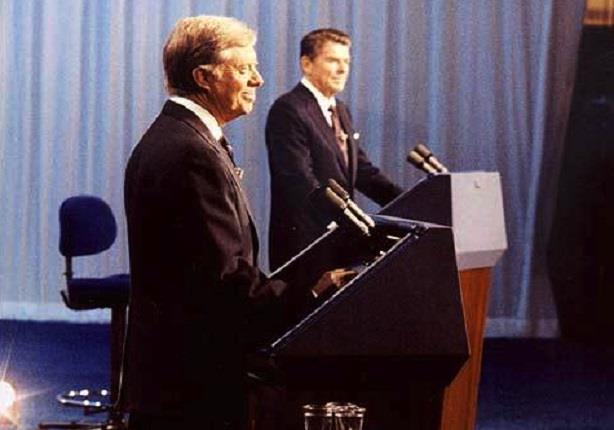 W
W"There you go again" was a phrase spoken during the second presidential debate of 1980 by Republican presidential candidate Ronald Reagan to his Democratic opponent, incumbent President Jimmy Carter. Reagan would use the line in a few debates over the years, always in a way intended to disarm his opponent.
 W
W